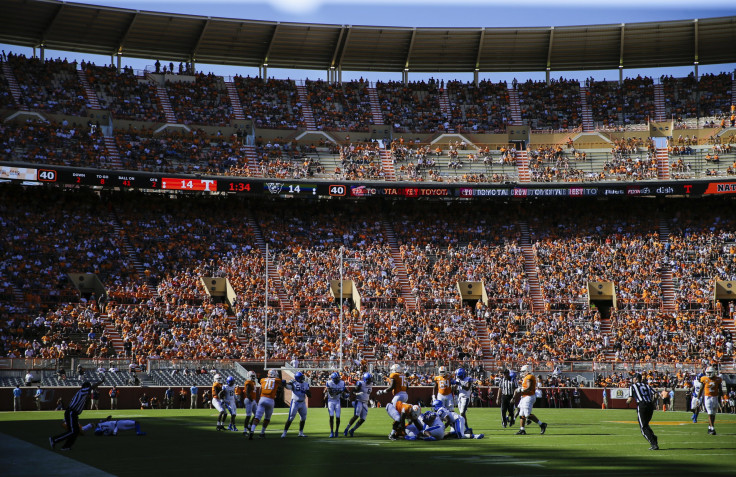College Quarterback Diagnosed With Heart Condition, Raising Further Questions About Football Season

The lingering issue of serious coronavirus-related health concerns, which threatens the impending college football season, continues to rear its ugly head as another athlete has been diagnosed with a heart condition.
Georgia State quarterback Mikele Colasurdo announced Thursday that he won’t play football in 2020 because of a heart condition that resulted from his coronavirus infection. The freshman arrived on campus in the spring.
Colasurdo plays in one of the six FBS conferences that will compete in the fall football season. The MAC, Mountain West, Big Ten and Pac-12 have all decided against playing football, in part because of the heart complications that come from contracting the coronavirus.
For all the people who think college athletes will just be fine if they catch Covid. Mikele I know will bounce back like a champ tho‼️ https://t.co/pHai4i9dzo
— quincy_avery (@Quincy_Avery) August 20, 2020
Myocarditis, an inflammation of the heart, has been an issue in discussions about whether to play football in 2020. At least 10 Big Ten athletes had been diagnosed with the condition when the conference postponed all fall sports, The Athletic reported. The Big 12 has been concerned with what it might mean for the upcoming football season.
“We discuss it on every call,” one team doctor from a Power Five conference told Sports Illustrated.
The Big 12, ACC and SEC expect to start playing games next month. Notre Dame, a football independent that’s set to play an ACC schedule this year, canceled practice Thursday in light of five football players testing positive for the coronavirus.
Appalachian State, part of the Sun Belt, has paused football practice indefinitely because of nearly 20 coronavirus cases connected to the program.
The college football season starts Sept. 3 when The Sun Belt’s South Alabama takes on Southern Mississippi of Conference USA. That, however, is subject to change if the conference decision-makers deem it unsafe to play.
“The Sun Belt Conference will continue to monitor health trends across our communities,” the league said in a statement earlier this month. “Sun Belt Presidents and Chancellors, Athletics Directors, the COVID-19 Advisory Panel, and medical advisors will continue to review data to ensure a safe return to activities and competition. Our data review will cross seven states and 12 counties and include, among other things, infection rates, hospitalization rates, local health directives, advancements in COVID-19 testing and campus, department and team health trends.”
Conditions that do matter, per the P5 document:
— Ross Dellenger (@RossDellenger) August 20, 2020
1 lack of ability to isolate/quarantine
2 inability for weekly testing
3 "unsafe" community test rates
4 inability to perform adequate contact tracing
5 inability for local hospitals to accommodate a surge in COVID hospitalizations
Conferences have put protocols in place in an attempt to keep players as safe as possible. The Big 12, for example, will test football players for the coronavirus three times a week. Following positive tests, athletes will undergo an EKG, troponin blood test, echocardiogram, and a cardiac MRI.
It appears inevitable that some players will test positive for the coronavirus in the coming weeks and months. College football won’t be played inside an official bubble, which the NBA and WNBA have instituted, resulting in negative tests across the board.
The mother of Indiana offensive lineman Brady Feeney wrote a Facebook post about her son’s heart issues after contracting the coronavirus. Major League Baseball pitcher Eduardo Rodriguez, who is 27 years old, will miss the whole season with myocarditis.
© Copyright IBTimes 2025. All rights reserved.






















